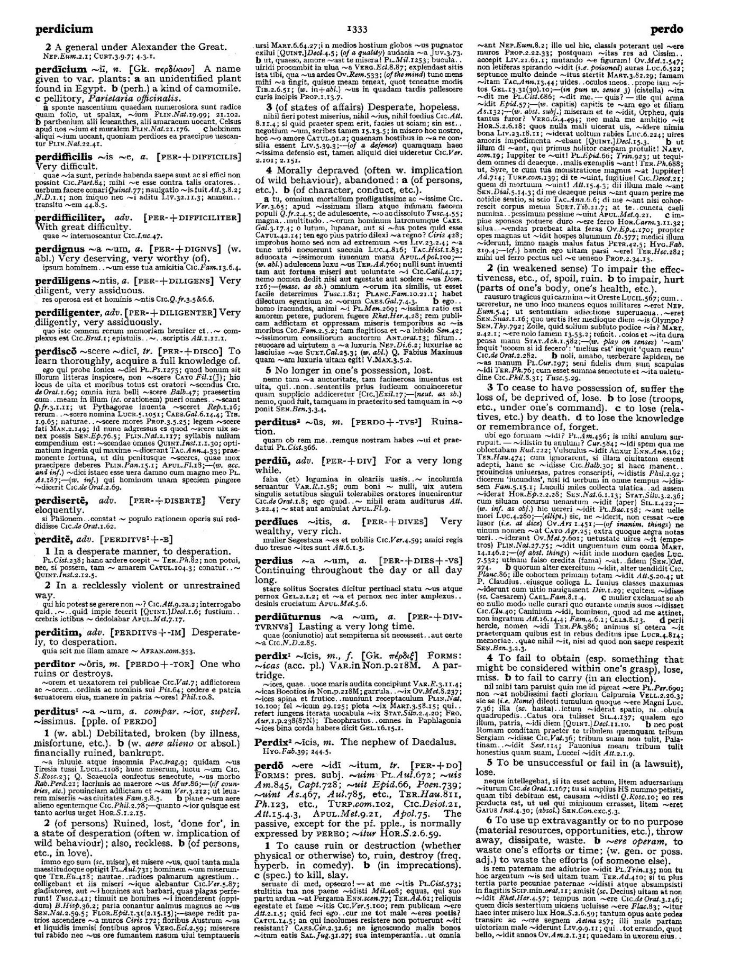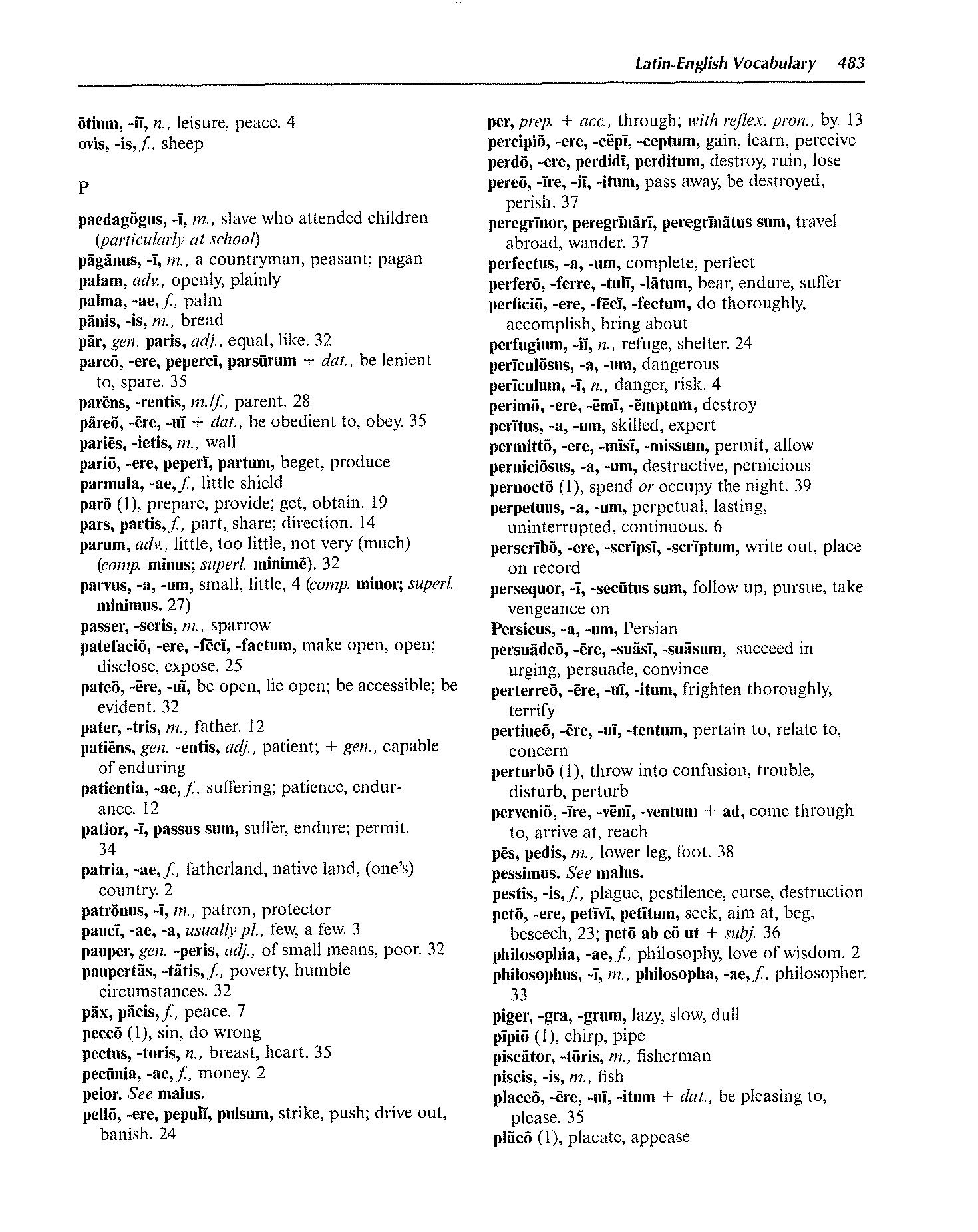
page_listing.tpl
page_subListingDetails.tpl
sub_listingDetails_style1.tpl
sub_listingDetails.title.tpl
perdere to destroy
perdere is a Latin Verb that primarily means to destroy.
Definitions for perdere
Wheelock's Latin
Verb
- 1
destroy, ruin, lose
Oxford Latin Dictionary
Verb
- 1
To cause ruin or destruction (whether physical or otherwise) to, ruin, destroy (freq. hyperb. in comedy). (b) (in imprecations). (c) (spec.) to kill, slay.
- 2
(in weakened sense) To impair the effectiveness, etc., of, spoil, ruin. (b) to impair, hurt (parts of one's body, one's health, etc.).
- 3
To cease to have possession of, suffer the loss of, be deprived of, lose. (b) to lose (troops, etc., under one's command). (c) to lose (relatives, etc.) by death. (d) to lose the knowledge or remembrance of, forget.
- 4
To fail to obtain (esp. something that might be considered within one's grasp), lose, miss. (b) to fail to carry (in an election).
- 5
To be unsuccessful or fail in (a lawsuit), lose.
Sentences with perdere
Latin to English
Miser Catulle, desinas ineptire, et quod vides perisse perditum ducas.Compare Poor Catullus, 'tis time you should cease your folly, and account as lost what you see is lost. [Tr. F. W. Cornish]
Satis est superare inimicum, nimium est perdere.Compare It is enough to defeat an enemy, too much to ruin him.
Multus (homo) parens, multus amicus, nonnullus patria perdo.Compare Many men have ruined their parents, many their friends, some their country.
Stultum facit fortuna quem vult perdere.Compare Whom fortune would ruin she deprives of good sense.
Istic ille perdo assentatio.Compare This same flattery has ruined him.
Recordatus quondam super cenam, quod nihil cuiquam toto die praestitisset, memorabilem illam meritoque laudatam vocem edidit: "Amici, diem perdidi." [Divus Titus, VIII,1]Compare On one occasion, recalling at dinner that he [Titus] had not granted a single favor all day, he uttered this memorable and justly praised remark: "Friends, I have lost a day."
Conjugation table for perdere
Cactus2000
| ACTIVE | |
| Indicative present | Indicative imperfect |
| perdō perdis perdit perdimus perditis perdunt | perdēbam perdēbās perdēbat perdēbāmus perdēbātis perdēbant |
| Indicative perfect | Indicative pluperfect |
| perdidī perdidistī perdidit perdidimus perdidistis perdidērunt / perdidēre | perdideram perdiderās perdiderat perdiderāmus perdiderātis perdiderant |
| Indicative future | Indicative future perfect |
| perdam perdēs perdet perdēmus perdētis perdent | perdiderō perdideris perdiderit perdiderimus perdideritis perdiderint |
| Subjunctive present | Subjunctive imperfect |
| perdam perdās perdat perdāmus perdātis perdant | perderem perderēs perderet perderēmus perderētis perderent |
| Subjunctive perfect | Subjunctive pluperfect |
| perdiderim perdideris perdiderit perdiderimus perdideritis perdiderint | perdidissem perdidissēs perdidisset perdidissēmus perdidissētis perdidissent |
Infinitive present perdere Infinitive perfect perdidisse Infinitive future perditūrum esse | Imperative present perde perdite Imperative future perditō perditō perditōte perduntō |
| PASSIVE | |
| Indicative present | Indicative imperfect |
| perdor perderis perditur perdimur perdiminī perduntur | perdēbar perdēbāris / perdēbāre perdēbātur perdēbāmur perdēbāminī perdēbantur |
| Indicative perfect | Indicative pluperfect |
| perditus sum perditus es perditus est perditī sumus perditī estis perditī sunt | perditus eram perditus erās perditus erat perditī erāmus perditī erātis perditī erant |
| Indicative future | Indicative future perfect |
| perdar perdēris / perdēre perdētur perdēmur perdēminī perdentur | perditus erō perditus eris perditus erit perditī erimus perditī eritis perditī erunt |
| Subjunctive present | Subjunctive imperfect |
| perdar perdāris / perdāre perdātur perdāmur perdāminī perdantur | perderer perderēris / perderēre perderētur perderēmur perderēminī perderentur |
| Subjunctive perfect | Subjunctive pluperfect |
| perditus sim perditus sīs perditus sit perditī sīmus perditī sītis perditī sint | perditus essem perditus essēs perditus esset perditī essēmus perditī essētis perditī essent |
Infinitive present perdī Infinitive perfect perditum esse Infinitive future perditum īrī | Imperative present perdere perdiminī Imperative future perditor perditor - perduntor |
| PARTICIPLE | ||
| Participle present active | ||
| Nom. | perdēns | perdentēs |
| Gen. | perdentis | perdentium |
| Dat. | perdentī | perdentibus |
| Acc. | perdentem | perdentēs |
| Abl. | perdente | perdentibus |
| Participle future active | ||
| Nom. | perditūrus | perditūrī |
| Gen. | perditūrī | perditūrōrum |
| Dat. | perditūrō | perditūrīs |
| Acc. | perditūrum | perditūrōs |
| Abl. | perditūrō | perditūrīs |
| Participle perfect passive | ||
| Nom. | perditus | perditī |
| Gen. | perditī | perditōrum |
| Dat. | perditō | perditīs |
| Acc. | perditum | perditōs |
| Abl. | perditō | perditīs |
| Gerundive | ||
| Nom. | perdendus | perdendī |
| Gen. | perdendī | perdendōrum |
| Dat. | perdendō | perdendīs |
| Acc. | perdendum | perdendōs |
| Abl. | perdendō | perdendīs |
| Gerund | Supine | |
| Nom. | perdere | perditum |
| Gen. | perdendī | perditū |
| Dat. | perdendō | |
| Acc. | perdendum | |
| Abl. | perdendō | |
Data sources
Notes
- Definitions
- Frederick M. Wheelock, Wheelock's Latin, 6th ed., rev. Richard A. LaFleur (New York, NY: HarperCollins Publishers, 2005): 483.
- P. G. W. Glare, Oxford Latin Dictionary, Vols. 1-8 (Oxford: Clarendon Press, 1982): 1333.
- Word frequencies
- Christopher Francese, "Latin Core Vocabulary," Dickinson College Commentaries, last modified 2014, http://dcc.dickinson.edu.
- Paul B. Diederich, The Frequency of Latin Words and Their Endings, PhD diss., (Columbia University, 1939).
- Louis Delatte, Suzanne Govaerts, Joseph Denooz, and Etienne Evrard, Dictionnaire fréquentiel et index inverse de la langue latine [Frequency Dictionary and Inverse Index of the Latin Language] (Liège, Belgium: Laboratoire d'analyse statistique des langues anciennes de l'Université de Liège [L.A.S.L.A.], 1981): 122.
Bibliography
Allen, Joseph H. Allen and Greenough's New Latin Grammar for Schools and Colleges: Founded on Comparative Grammar. Edited by James B. Greenough, George L. Kittredge, Albert A. Howard, and Benjamin L. D'Ooge. Boston, MA: Ginn & Company, 1903.
Crystal, David. A Dictionary of Linguistics and Phonetics. 6th ed. Oxford, UK: Blackwell Publishing, 2008.
Delatte, Louis, Suzanne Govaerts, Joseph Denooz, and Etienne Evrard. Dictionnaire fréquentiel et index inverse de la langue latine [Frequency Dictionary and Inverse Index of the Latin Language]. Liège, Belgium: Laboratoire d'analyse statistique des langues anciennes de l'Université de Liège (L.A.S.L.A.), 1981.
Diederich, Paul B. The Frequency of Latin Words and Their Endings. PhD diss., Columbia University, 1939.
Francese, Christopher. "Latin Core Vocabulary." Dickinson College Commentaries. Last modified 2014. http://dcc.dickinson.edu/latin-vocabulary-list.
Gildersleeve, Basil L., and Gonzales Lodge. Gildersleeve's Latin Grammar: Third Edition, Revised, and Enlarged. 3rd ed. London, England: Macmillan and Co., 1903.
Glare, Peter G.W. Oxford Latin Dictionary. Vols. 1-8. Oxford, England: Clarendon Press, 1982.
Krüger, Bernd. "Latin Conjugation Tables." Cactus2000. Accessed May 5, 2023. https://latin.cactus2000.de/index.en.php.
Pierson, Nick. "Sound of Text." Accessed October 26, 2019. https://soundoftext.com.
Wheelock, Frederick M. Wheelock's Latin. 6th ed. Revised by Richard A. LaFleur. New York, NY: HarperCollins Publishers, 2005.
Wiktionary Contributors. "Victionarium." Wikimedia Foundation, Inc. Updated March 18, 2019. https://la.wiktionary.org/wiki/Victionarium:Pagina_prima.
Citation
Chicago (17th ed.)
Allo Contributors. "perdō, perdere, perdidī, perditum (v.) - Latin Word Definition." Allo Latin Dictionary. Last modified . Accessed February 20, 2026. http://ancientlanguages.org/latin/dictionary/perdo-perdere-perdidi-perditum.
Entry created on . Last updated on .







